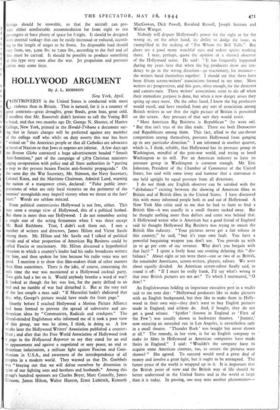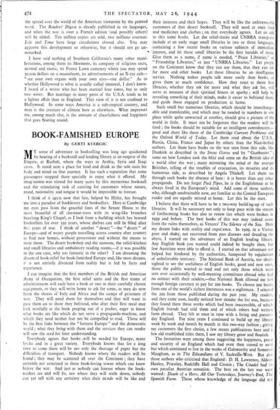HOLLYWOOD ARGUMENT
By J. L. HODSON New York, April.
CONTROVERSY in the United States is conducted with more
o violence than in Britain. That is natural, for it is a country of
great contrasts—great droughts, great floods, great heat, great cold. I I recollect that Mr. Roosevelt didn't hesitate to call the Voting Bill a a fraud, and that two months ago Dr. George N. Shuster, of Hunter College, New York, printed in the Herald-Tribune a document say- ing that in future charges will be preferred against any member of the college staff who while .on duty asserts this war has been " wished on " the American people or that all Catholics are advocates at heart of Nazism or that Jews or negroes are inferior. A few days ago the Boston Globe contained a huge advertisement headed " Smash Anti-Semitism," part of the campaign of 3,879 Christian ministers urging co-operation with police and all State authorities in " putting a stop to the present brazen Fascist anti-Semitic propaganda." On the same clay the. War Secretary, Mr. Stimson, the Navy Secretary, Colonel. Knox, and the Maritime Chairman, Admiral Land, warning the nation of a manpower crisis, declared: " False public inter- pretations of what are only local victories on the perimeter of the enemies' strongholds may imperil victory when we thrust at the foes' heart." Words are seldom minced.
From political controversies Hollywood is not free, either. This may seem a strange view of Hollywood, this of a political hotbed. But there is more than one Hollywood. I do not remember seeing a single star of the acting firmament when I was there except Mr. Basil Rathbone. True, I didn't seek them out. I met a number of writers and directors, James Hilton and Victor Savile among them. Mr. Hilton and Mr. Savile and I talked of political trends and of what proportion of American Big Business could be called Fascist or reactionary. Mr. Hilton discussed a hypothetical situation in which a country's leader had his radio broadcasts written for him, and then spoken for him because his radio voice was not good. I mention it to show that film-makers think of other matters than films sometimes. There is the joke, of course, concerning the only time the war was mentioned at a Hollywood cocktail party. Two girls had a bet on it. Would anybody breathe a word of war? It looked as though the bet was lost, for the party drifted to an end and no rumble of war had disturbed it. But at the very exit of the last couple a man said: " If Mussolini hadn't abdicated that day, why, George's picture would have made the front page."
Shortly before I reached Hollywood a Motion Picture Alliance had been formed to prevent the spread of subversive and un- American ideas by " Communists, Radicals and crackpots." The liberal-minded Englishman who informed me of it took a poor view of this group, nor was he alone, I think, in doing so. A few weeks later the Hollywood Writers' Association published a counter- blast ; and after that the Free World Association of Hollywood took 1 a page in the Hollywood Reporter to say they stand for an end
to appeasement and against a negotiated or easy peace, an end to American isolationism, a militant fight against Fascism and Com- munism in U.S.A., and awareness of the interdependence of all Peoples in a modern world. They warned us that Dr. Goebbels Was "braying out that we will defeat ourselves by dissension in spite of our fighting sons and brothers and husbands." Among this group's hundred sponsors are Charles Boyer, Marc Connelly, James Gleason, James Hilton, Walter Huston, Ernst Lubitsch, Kenneth MacGowan, Dick Powell, Rosalind Russell, Joseph Sistrom and Walter Wanger.
Nobody will dispute Hollywood's power for the right or for the wrong or, on the other hand, its ability to dodge the issue, as exemplified in the making of " For Whom the Bell Tolls." But Ahere are a good many watchful eyes and ardent spirits working there. I may, perhaps, quote the opinion of a shrewd observer of the Hollywood scene. He said : " It has frequently happened during my years here that when the big producers show any ten- dency to go in the wrong direction—go reactionary, for instance— the writers band themselves together. I should say that there have been fifteen screen-writers' associations formed in my time. Most writers are progressives, and this goes, often enough, for the directors and camera-men. These writers' associations seem to die off when their immediate purpose is done, but when a new danger arises they spring up once more. On the other hand, I know the big producers would recoil, and have recoiled, from any sort of association among British writers to see that the right picture of Britain is presented on the screen. Any pressure of that sort they would resist.
" Most American Big Business is Republican " (he went on). " But that isn't true of the film trade. There are both Democrats and Republicans among them. This fact, allied to the cut-throat competition among themselves, prevents Hollywood from ganging up in any particular direction." I am informed in another quarter, which is, I think, reliable, that Hollywood has its pressure group in Washington, mindful of the post-war world, and trying to bend Washington to its will. For an American industry to have its pressure group in Washington is common enough. Mr. Eric Johnston, President of the Chamber of Commerce of the United States, has said with some irony and humour that a statesman is one held upright by equal pressure from all directions.
I do not think any English observer can be satisfied with the "disbalance " existing between the showing of American films in Britain and of British films in the United States. I have discussed this with many informed people both in and out of Hollywood. A New York film critic said to me that he had to hunt to find a British film—it was usually in a small theatre tucked away. But he thought nothing more than dollars and cents was behind that. A Hollywood writer who is American but a good friend of England said he thought Hollywood Big Business was trying to smash the British film industry. " Your pictures never get a fair release in this country," he said, " but it's your. own fault. You have a powerful bargaining weapon you don't use. You provide us with 3o to 4o per cent. of our revenue. Why don't you bargain with that fact? " I spent a lively hour one evening debating this " dis- balance." About eight or ten were there—one or two of us British, the remainder Americans, screen-writers, players, editors. We were about equally divided. An American screen-editor finally said, to
round it off: " If I must be really frank, I'd say what's wrong is that your British pictures are not art." To which I murmured, " 0 dear!,"
An Englishwoman holding an important executive post in a studio said to me next day : "Hollywood producers like to make pictures with an English background, but they like to make them in Holly- wood in their own way—they don't want to buy English pictures made in England, and seldom do. And, if bought, they do not
get a good release. ' Spitfire' (known in England as ' First of the Few ') was usually shown in backwater theatres. ' Jeannie,' now enjoying an extended run in Los Angeles, is never. theless only in a small theatre. ' Thunder Rock' was bought but never shown
at all." The remedy, in her view, is for an English company to make its films in Hollywood as American companies have made theirs in England." I said : " Wouldn't the company have to acquire some American cinemas, too, to ensure the pictures were shown? " She agreed. To succeed would need a great deal of money and involve a great fight, but it ought to be attempted. The future peace of the world is wrapped up in it. It is important that the British point of view and the British way of life should be better understood in the United States and in the world at large than it is today. In passing, one may note another phenomenon-
the spread over the world of the American viewpoint by the printed word. The Readers' Digest is already published in six languages, and when the war is over a French edition (and possibly others) will be added. Ten million copies are sold, two millions overseas. Life and Time have large circulations abroad also. You may approve this development or otherwise, but it should not go un-
remarked. • I have said nothing of Southern California's many other mani- festations, among them its Mormons, its company of religious sects, normal and exotic, its Forest Lawn cemetery where you may spend 5o,000 dollars on a mausoleum, its advertisements of an X-ray cult- " see your own organs with your own eyes—one dollar." As to whether Hollywood is what is usually called immoral, I don't know. I heard of a writer who has been married four times, but to only two wives. But marriage in many parts of the U.S.A. tends to be a lighter affair than in England. This view of it is not confined to Hollywood. In some ways America is a sub-tropical country, and man is the creature of climate here as elsewhere. What impresses me, among much else, is the amount of cheerfulness and happiness that goes floating round.



























 Previous page
Previous page